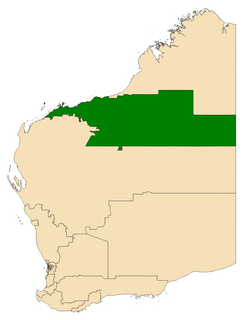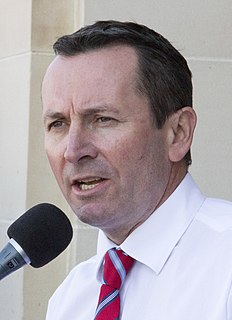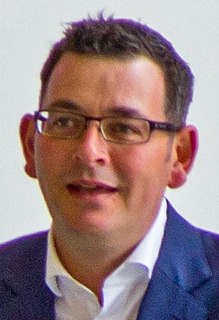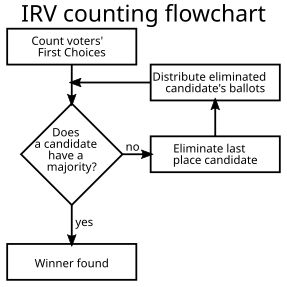
The state election for the 51st Parliament of South Australia was held in the Australian state of South Australia on 18 March 2006, and was conducted by the independent State Electoral Office.

The Electoral district of Pilbara is a Legislative Assembly electorate in the state of Western Australia. Pilbara is named for the region of Western Australia in which it is located. It is one of the oldest electorates in Western Australia, with its first member having been elected to the Second Parliament of the Legislative Assembly at the 1894 elections.
State elections were held in South Australia on 11 December 1993. All 47 seats in the South Australian House of Assembly were up for election. The incumbent Australian Labor Party led by Premier of South Australia Lynn Arnold was defeated by the Liberal Party of Australia led by Leader of the Opposition Dean Brown. The Liberals won what is still the largest majority government in South Australian history.

Mark McGowan is an Australian politician, the 30th and current Premier of Western Australia.

The 2010 South Australian state election elected members to the 52nd Parliament of South Australia on 20 March 2010. All seats in the House of Assembly or lower house, whose current members were elected at the 2006 election, and half the seats in the Legislative Council or upper house, last filled at the 2002 election, became vacant.

Kwinana is an electoral district of the Legislative Assembly in the Australian state of Western Australia.

West Swan is an electoral district of the Legislative Assembly in the Australian state of Western Australia. It is located in the north-eastern suburbs of Perth.

Andrea Ruth Mitchell is an Australian politician who was a member of the Legislative Assembly of Western Australia from 2008 to 2017, representing the seat of Kingsley. She was a minister in the government of Colin Barnett from March 2016.

The Northern Territory general election was held on Saturday 25 August 2012, which elected all 25 members of the Legislative Assembly in the unicameral Northern Territory Parliament. The 11-year Labor Party government led by Chief Minister Paul Henderson was defeated in their attempt to win a fourth term against the opposition Country Liberal Party led by opposition leader Terry Mills with a swing of four seats, losing the normally safe Labor remote seats of Arafura, Arnhem, Daly and Stuart, whilst retaining their urban seats picked up at the 2001 election.
Lisa Loraine Baker is an Australian politician who has been a Labor Party member of the Legislative Assembly of Western Australia since 2008, representing the seat of Maylands.

The 2014 South Australian state election elected members to the 53rd Parliament of South Australia on 15 March 2014, to fill all 47 seats in the House of Assembly and 11 of 22 seats in the Legislative Council. The 12-year-incumbent Australian Labor Party (SA) government, led by Premier Jay Weatherill, won its fourth consecutive four-year term in government, a record 16 years of Labor government, defeating the opposition Liberal Party of Australia (SA), led by Opposition Leader Steven Marshall.

The 2016 Northern Territory general election was held on Saturday 27 August 2016 to elect all 25 members of the Legislative Assembly in the unicameral Northern Territory Parliament.

A by-election for the New South Wales Legislative Assembly seat of Sydney was held on Saturday 27 October 2012. The by-election was triggered by the resignation of independent MP Clover Moore due to the Local Government Amendment Act, 2012 (NSW) preventing dual membership of state parliament and local council.

The 2017 Western Australian state election was held on Saturday 11 March 2017 to elect members to the Parliament of Western Australia, including all 59 seats in the Legislative Assembly and all 36 seats in the Legislative Council. The eight-and-a-half-year two-term incumbent Liberal–WA National government, led by Premier Colin Barnett, was defeated by the Labor opposition, led by Opposition Leader Mark McGowan.

The 2018 South Australian state election to elect members to the 54th Parliament of South Australia was held on 17 March 2018. All 47 seats in the House of Assembly or lower house, whose members were elected at the 2014 election, and 11 of 22 seats in the Legislative Council or upper house, last filled at the 2010 election, were contested. The record-16-year-incumbent Australian Labor Party (SA) government led by Premier Jay Weatherill was seeking a fifth four-year term, but was defeated by the opposition Liberal Party of Australia (SA), led by Opposition Leader Steven Marshall. Nick Xenophon's new SA Best party unsuccessfully sought to obtain the balance of power.

The 2018 Victorian state election was held on Saturday, 24 November 2018 to elect the 59th Parliament of Victoria. All 88 seats in the Legislative Assembly and all 40 seats in the Legislative Council were up for election. The first-term incumbent Labor government, led by Premier Daniel Andrews, won a second four-year term, defeating the Liberal/National Coalition opposition, led by Opposition Leader Matthew Guy. Minor party the Greens led by Samantha Ratnam also contested the election.

The 2022 South Australian state election will elect members to the 55th Parliament of South Australia on 19 March 2022. All seats in the House of Assembly or lower house, whose current members were elected at the 2018 election, and half the seats in the Legislative Council or upper house, last filled at the 2014 election, will become vacant. The first term incumbent Liberal Party of Australia (SA) government, currently led by Premier Steven Marshall, will seek a second four-year term and will be challenged by the Australian Labor Party (SA) opposition, currently led by Opposition Leader Peter Malinauskas.



















